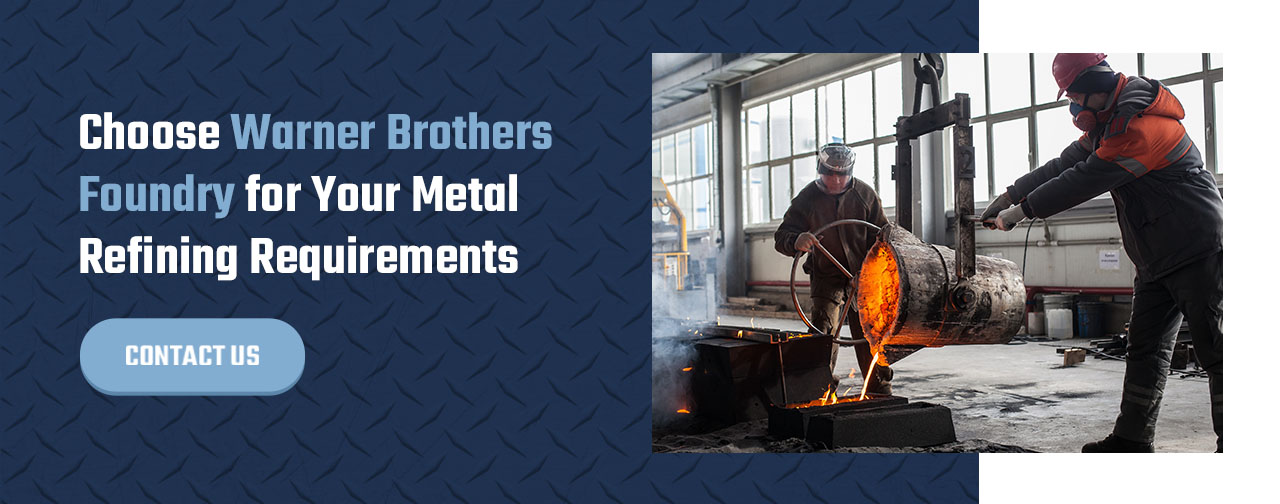Cleaning is the last stage of the metal casting process, and it’s critical to ensure the functionality and durability of the final product. Depending on the type of metal and the impurities it contains, the caster may need to use various cleaning methods. These might include electrolysis, distillation, liquation or vapor phase refining. All processes remove sand, scale and other impurities, providing a better-quality product.
Learn what’s involved in metal refining and why this process is so important.
What Does It Mean to Clean and Refine Metals?
Metal cleaning is a process in which undesirable elements are removed from molten metal. These impurities may include chemicals like sulfur, nitrogen, oxygen and hydrogen, all of which significantly affect the quality of the final product. As a result, an extensive refining process is crucial to obtain a metal of the highest purity.
Cleaning metals involves removing surface contaminants like dirt, oil, rust, scale and grease. It might require the technician to use cleaning agents, abrasives or chemical treatments to eliminate these unwanted substances and achieve a clean surface. This process is usually performed prior to applying paint or another finish to a metallic surface.
How Is Cast Metal Cleaned?
The process used to clean metals depends on the type of metal and impurities present. The following are some of the methods used for the refining of metals:
- Electrolysis: One of the most widely used methods for cleaning metals is electrolytic refining. Used for metals like copper, zinc, lead, tin, nickel, silver and gold, electrolysis involves using a thick block of impure metal as an anode. The block is then connected to the positive terminal of a battery to create a reaction and dissolve the impurities in the workpiece.
- Liquation: This process uses heat to break down metals and free trapped impurities. For metals with low melting points, heat is applied at a temperature just above this point to convert the metal into a liquid. Impurities are left behind as the pure metal melts and flows from the furnace.
- Vapor phase refining: This type of purification of metals, often used for nickel, involves converting the metal into a gaseous compound in the presence of a reagent. Once the reagent is broken down, the impurities become a volatile compound that can be removed to leave pure metal behind.
- Distillation: This method involves purifying metals with a low boiling point, such as zinc and mercury. The metal is heated above its boiling point to create vapors. Since they do not evaporate, the impurities remain behind when the metal becomes vapor. The vapors are then collected and condensed to create pure metal.
- Zone refining: This process refines metals like silicon, gallium, boron, germanium and indium. It involves connecting the impure metal to a mobile heater at one end. The heater crystallizes the metal, transferring any impurities to the adjacent part of the piece. Contaminants accumulate on the other end of the rod, which is cut to yield pure metal.
It is possible to remove excess metal, burned-on sand, scale and many other impurities through these processes. The casting can then undergo welding or other procedures to create a final product.
Why Is Cleaning Metals Important?
Refining is essential in metallurgy. In nature, any metal taken from ore typically contains undesired elements. Refining the metal to remove them offers advantages like:
Increased Purity
The metal refining process removes impurities like oxides, sulfides and other contaminants. Cleaning metals results in a consistent, stable final product, thereby ensuring it meets specific quality and performance standards. For instance, pure metals perform better in terms of electrical and thermal conductivity, allowing for much better function in specific applications.
Improved Durability
Metals that have been refined are much more durable than their unrefined counterparts, which results in stronger components that can stand up to wear and tear. Industries like automotive, electronics, aerospace and construction depend on durable, high-quality products. Purifying metals before machining or welding them equips these products to meet safety and reliability standards.
Enhanced Longevity
Metals that are properly cleaned and purified are less susceptible to corrosion. Rust in iron or tarnish on silver, for instance, will weaken the metal’s structure and shorten its life span. Removing impurities that invite corrosion can increase a metal’s longevity and lessen the likelihood of mechanical failures by eliminating weak points. Additionally, any metal that will receive a surface finish must undergo a meticulous cleaning process to ensure proper adhesion.
Choose Warner Brothers Foundry for Your Metal Refining Requirements
The cleaning and purification of metals are crucial elements of the casting process. By eliminating impurities, the caster creates higher-quality products that can stand up to wear and tear. At Warner Brothers Foundry, we have refined our approach over the years to develop methods that exceed quality standards. We are your one-stop shop for custom casting foundry services, and we guarantee our casting quality.
Learn more about our quality standards, or contact us online to discuss your project requirements.


